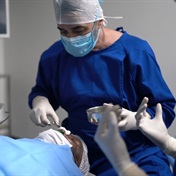The first clinical trials that examine the use of stem cells to treat two forms of blindness are ready to begin now that patients have been enrolled, a US company announced.
A total of 24 patients have entered two separate trials at an eye institute in California, said representatives from the Massachusetts-based Advanced Cell Technology.
ACT was cleared by the US Food and Drug Administration several months ago to begin clinical trials of human embryonic stem cells to treat a form of juvenile blindness known as Stargardt's disease and dry age-related macular degeneration.
Now that patients have been enrolled, the trials will begin "in the very near future," a company spokeswoman said.
Preventing blindness
The trials aim to check the safety of the treatment before moving on to see whether the therapy can help stop vision loss.
"These trials mark a significant step toward addressing what is one of the largest unmet medical needs of our time, treatments for otherwise untreatable and common forms of legal blindness," said lead investigator Steven Schwartz at University of California Los Angeles Jules Stein Eye Institute.
Dry age-related macular degeneration is the most common form of irreversible vision loss in people over age 55.
There is currently no cure for the disease, which affects around 10-15 million Americans and another 10 million people in Europe, the company said.
Stargardt’s disease
Stargardt's disease causes blindness by destroying the pigmented layer of the retina, called the retinal pigment epithelium (RPE). After that follows degradation of photoreceptors, which are cells in the retina that detect light.
Patients often experience blurry vision, difficulty seeing in low-light and eventually most lose their ability to see at all. The disease can be inherited by a child when two parents carry the gene mutation that causes it.
The treatment process being tested by ACT worked in animals by creating an abundance of new RPE cells, which are the first cells to die off in Stargardt's and other forms of macular degeneration.
Tests on rats have shown 100% improvement in visual performance and "near-normal function" was also achieved in mice, both without negative side effects, ACT has said.
Embryonic stem cell research has been a controversial field ever since the first such stem cells were isolated more than 12 years ago.
Scientists say the cells offer great promise in treating Parkinson's disease, diabetes and a variety of other illnesses. Critics frequently oppose the research on religious grounds because it involves the destruction of human embryos.
(Sapa, June 2011)
Read more:




 Publications
Publications
 Partners
Partners










